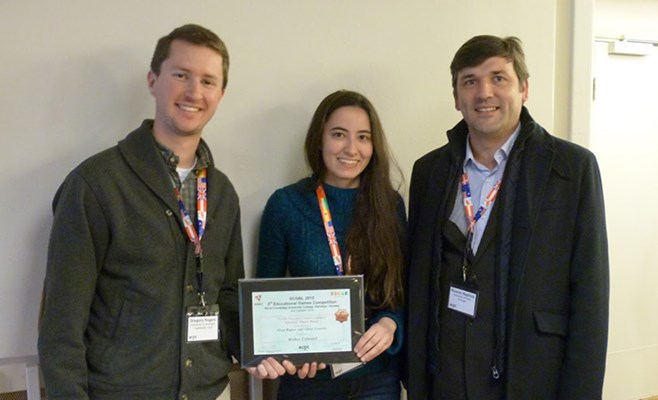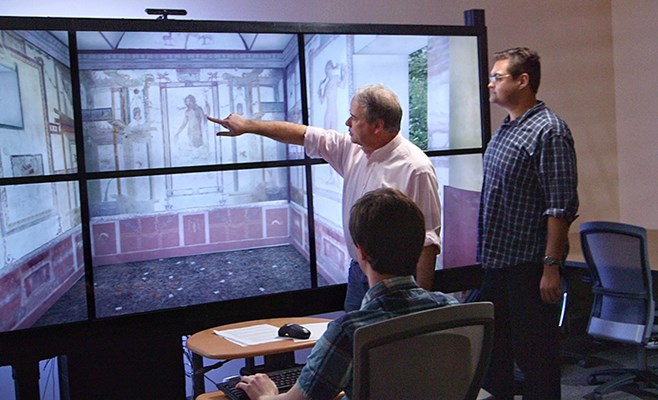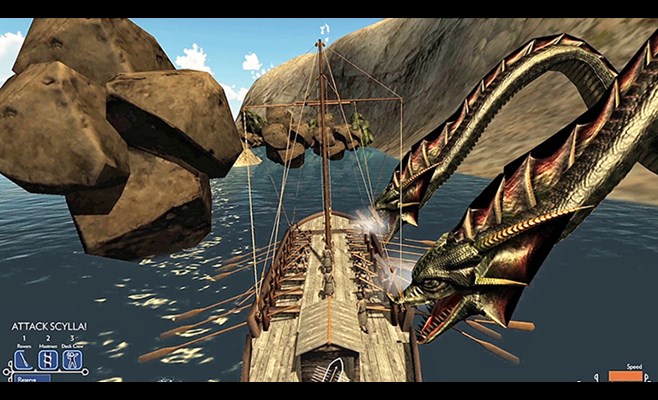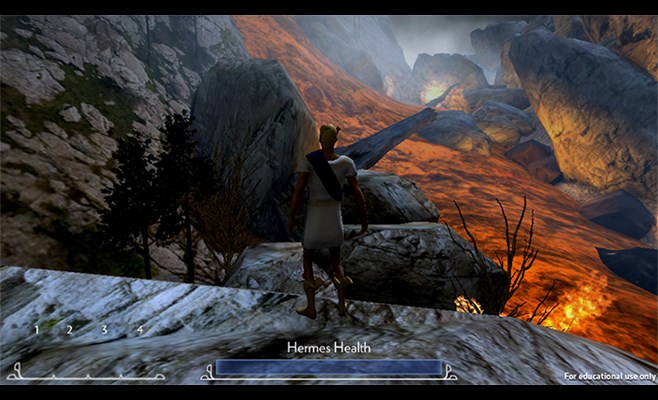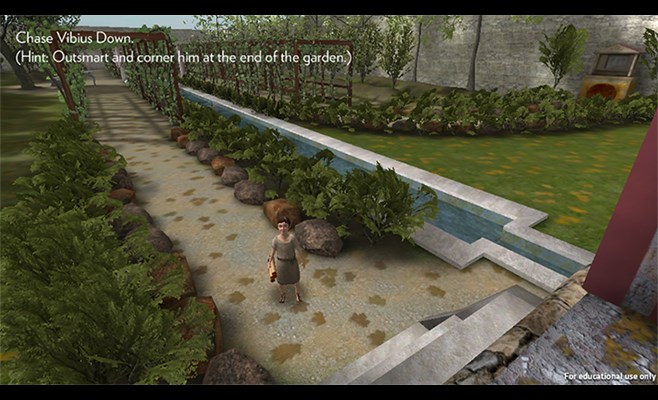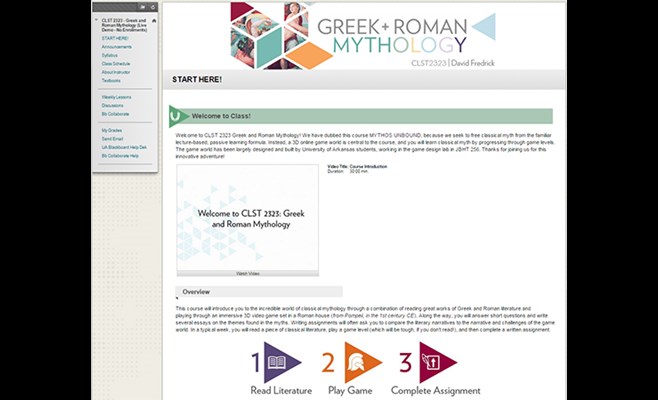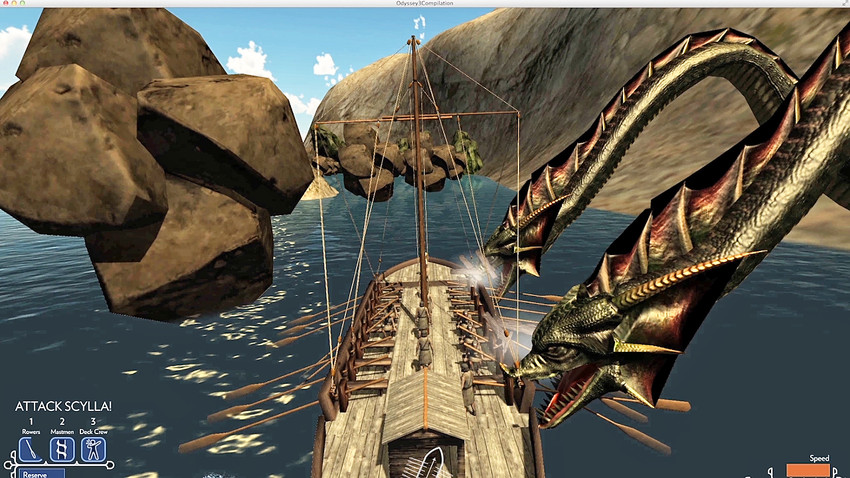
FAYETTEVILLE, Ark. — An academic course that feeds students to monsters and hands them the bow of Odysseus -- virtually, of course -- has won two awards for the Tesseract Studio at the University of Arkansas.
The studio received the awards at the 9th European Conference on Games-Based Learning this month in Steinkjer, Norway.
David Fredrick, head of Tesseract Studio for Immersive Environments and Game Design, and his team of students and former students won the international awards for Mythos Unbound. It is a game-based, semester-long academic course that immerses students in Greek and Roman mythology, a world teeming with heroes and monsters. Fredrick is also a classical studies professor and director of the humanities program in the J. William Fulbright College of Arts and Sciences. He teaches the course that uses Mythos Unbound.
Mythos Unbound won first place in the “installed on a computer” category and third place overall, rising to the top of more than 60 original contest entries.
The course is just one of the projects underway at Tesseract Studio, an interdisciplinary game design lab where for undergraduate and graduate students from across the Fayetteville campus develop game-based learning content that is then used in U of A academic courses taken by other students.
“Tesseract Studio is a gem on the Fayetteville campus,” Fulbright College Dean Todd Shields said. “It is a brilliant example of how the university uses innovative teaching strategies and cutting-edge technology to help students grasp ancient concepts and constructs. By winning these international awards, Tesseract Studio, Dr. Fredrick, his staff and his students have shown that our university can compete on a global level in course development.
Tesseract Studio, recently featured in an Arkansas Times cover story, is unique because it serves as the learning environment for students to produce interactive, game-based educational content. The games are then used in U of A academic courses with students in face-to-face, online or blended settings. Units across the campus provide a variety of resources and financial support for the studio and its innovative teaching strategies.
Mythos Unbound was first offered as an academic course at the U of A in fall 2013. It required students to review lectures, read classical works like Homer’s Odyssey, and immerse themselves in an educational online video game to reinforce ideas. Students in the game become the heroic characters they are studying, and they, as Odysseus, face the ravenous Scylla, a mythical monster.
Fredrick said he hopes students in this course can draw differences and similarities between modern culture and ancient cultures, as well as understand how people in past cultures confronted issues of social marginalization and the struggle to define identity.
In Norway, Tesseract employees Greg Rogers, narrative and design lead, and Chloe Costello, art director, represented Tesseract Studio in competition by giving presentations on Mythos Unbound to spectators and judges.
“The whole time was a mix of emotions, anxiety and excitement,” Rogers said. “It feels really good to be in front of an audience of academics and to accept awards.”
The studio staff also expanded their knowledge about other game-based learning efforts.
“I got to see what other people were doing from all over the world,” Costello said.
Last April in Atlanta, Tesseract Studio, Educational Development Corp., and Crystal Bridges Museum of American Art jointly received a “Gold” award from the American Alliance of Museums, for their online course, “Museum Mash Up: American Identity through the Arts.” For this course, Tesseract Studios developed “Gallery 5,” an interactive virtual gallery application.
In spring 2016, U of A students can enroll in Tesseract Studio’s next game-based online course, Saeculum, which explores Roman civilization.
“It’s 10 times better,” Rogers said, comparing it to the course that just won international honors.
Rogers and Costello worked on Mythos Unbound as undergraduate students. Rogers connected with Tesseract Studio in 2009 and Costello in 2011. Both graduated with bachelor’s degrees in May 2013, and then were hired on the Tesseract team to work with the next wave of students.
“We’re giving these students a valuable education and a valuable skill set that is internationally relevant,” Rogers said.
Some of students in the Saeculum course next year will experience educational game elements through Oculus headgear, which supports 3-D virtual reality.
“It’s a toe in the water, but it is a tangible way to use virtual reality in educational gaming,” Fredrick said. “Almost any subject can have this immersive game-based approach.”
Fredrick pointed out that college football coaches, including the Arkansas Razorbacks’ Bret Bielema and the Alabama Crimson Tide’s Nick Saban, use virtual reality and 3-D visualization software for training purposes.
“That is great technology for teaching, too,” Fredrick said.
In the future, Tesseract Studio intends to develop more game-based or game-enhanced modules for online and face-to-face teaching. Fredrick said he hopes to broaden the role of game design and immersive visualization across the disciplines, while formalizing the game design curriculum. Learn more about Tesseract Studio in the Fulbright Review.
The studio partners with the Center for Advanced Spatial Technologies; the Fay Jones School of Architecture and Design; the Honors College; Global Campus; Crystal Bridges Museum; students and faculty members from the social sciences, visual and performing arts, the humanities, natural sciences, and computer science in the College of Engineering.
About the J. William Fulbright College of Arts and Sciences: The J. William Fulbright College of Arts and Sciences is the largest and most academically diverse unit on campus with 19 departments and 43 academic programs and research centers. The college provides the core curriculum for all University of Arkansas students and is named for J. William Fulbright, former university president and longtime U.S. senator.
About the University of Arkansas: The University of Arkansas provides an internationally competitive education for undergraduate and graduate students in more than 200 academic programs. The university contributes new knowledge, economic development, basic and applied research, and creative activity while also providing service to academic and professional disciplines. The Carnegie Foundation classifies the University of Arkansas among only 2 percent of universities in America that have the highest level of research activity. U.S. News & World Report ranks the University of Arkansas among its top American public research universities. Founded in 1871, the University of Arkansas comprises 10 colleges and schools and maintains a low student-to-faculty ratio that promotes personal attention and close mentoring.
Topics
Contacts
David Fredrick, Tesseract Studio
J. William Fulbright College of Arts and Sciences
479-575-3792, dfredric@uark.edu
Ashlie Hilbun, director of development and external relations
J. William Fulbright College of Arts and Sciences
479-575-3712, ahilbun@uark.edu
